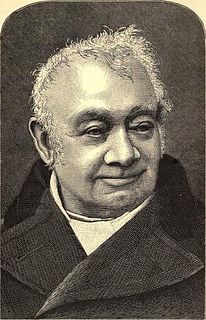
1826 (MDCCCXXVI) was a common year starting on Sunday of the Gregorian calendar and a common year starting on Friday of the Julian calendar, the 1826th year of the Common Era (CE) and Anno Domini (AD) designations, the 826th year of the 2nd millennium, the 26th year of the 19th century, and the 7th year of the 1820s decade. As of the start of 1826, the Gregorian calendar was 12 days ahead of the Julian calendar, which remained in localized use until 1923.

The temperance movement is a social movement against the consumption of alcoholic beverages. Participants in the movement typically criticize alcohol intoxication or promote complete abstinence from alcohol (teetotalism), and its leaders emphasize alcohol's negative effects on people's health, personalities and family lives. Typically the movement promotes alcohol education and it also demands the passage of new laws against the sale of alcohol, either regulations on the availability of alcohol, or the complete prohibition of it. During the 19th and early 20th centuries, the temperance movement became prominent in many countries, particularly in English-speaking and Scandinavian ones, and it eventually led to national prohibitions in Canada, in Norway and in the United States, as well as provincial prohibition in India.

Events from the year 1827 in Canada.
William Mackenzie, McKenzie or MacKenzie may refer to:

King O'Malley was an Australian politician who served in the House of Representatives from 1901 to 1917, and served two terms as Minister for Home Affairs. He is remembered for his role in the development of the national capital Canberra, as well as his advocacy for the creation of a national bank.
Hoyle is a surname. Notable people with the surname include:

Henry Brewster Stanton was an American abolitionist, social reformer, attorney, journalist and politician. His writing was published in the New York Tribune, the New York Sun, and William Lloyd Garrison's Anti-Slavery Standard and The Liberator. He was elected to the New York State Senate in 1850 and 1851. His wife, Elizabeth Cady Stanton, was a world renowned leading figure of the early women's rights movement.
Theobald is a Germanic dithematic name, composed from the elements theod- "people" and bald "bold". The name arrived in England with the Normans.
Goff is a surname with several distinct origins, mainly Germanic, Celtic, Jewish, and French. It is the 946th most common family name in the United States. When the surname originates from England it is derived from an occupational name from German, Cornish and Breton. The German Goff means a godly person, a strong warrior, or a priest. The Breton goff means "smith". The English-originating surname is common in East Anglia, where it is of Breton origin. The Welsh name is a variant of the surname Gough, and is derived from a nickname for someone with red hair. The native Irish name is derived from a patronymic form of the Gaelic personal name Eochaidh/Eachaidh, which means "horseman".

William Daniel was an American politician from the state of Maryland. A lawyer, he was a noted prohibitionist and abolitionist. He served in both houses of the Maryland state legislature, first as a Whig, and later as a member of the American Party. Later, as a Republican, he was a member of the convention that wrote Maryland's constitution in 1864. He helped found the Maryland Temperance Alliance in 1872 and served as its president for twelve years. Daniel was the vice presidential nominee and running mate of John St. John on the Prohibition Party ticket in the presidential election of 1884. Placing third in the election that year, he continued his involvement with the cause of temperance until his death in 1897.

Eric Douglas Harvey Hoyle, Baron Hoyle, JP is a British Labour politician and former Member of Parliament for Nelson and Colne and Warrington North.

The United Kingdom Alliance (UKA) was a temperance movement in the United Kingdom founded in 1853 in Manchester to work for the prohibition of the trade in alcohol in the United Kingdom. This occurred in a context of support for the type of law passed by General Neal Dow in Maine, United States, in 1851, prohibiting the sale of intoxicants.
Events from the year 1790 in Ireland.
Events from the year 1795 in Ireland.

William Sproston Caine was a British politician and Temperance advocate.
Wesley Bailey was an American newspaper editor and politician from New York.

Joseph William Livesey was an English temperance campaigner, social reformer, local politician, writer, publisher, newspaper proprietor and philanthropist.

The Temperance movement in the United States is a movement to curb the consumption of alcohol. It had a large influence on American politics and American society in the nineteenth and twentieth centuries, culminating in the unsuccessful prohibition of alcohol, through the Eighteenth Amendment to the United States Constitution, from 1920 to 1933. Today, there are organizations that continue to promote the cause of temperance.

The Temperance movement in the United Kingdom originated as a mass movement in the 19th century. Before this, though there were diatribes published against drunkenness and excess, total abstinence from alcohol was very rarely advocated or practised. The earliest temperance societies, inspired by the Belfast professor of theology, and Presbyterian Church of Ireland minister John Edgar, who poured his stock of whiskey out of his window in 1829, concentrated their efforts on spirits rather than wine and beer. Joseph Livesey was another British temperance advocate who financed his philanthropic work with the profits attained from cheese production, following an introduction to the food product by a doctor he had consulted with regards to a serious ailment in 1816. The term teetotal is derived from a speech by Richard (Dickie) Turner, a follower of Livesey, in Preston in 1833. Livesey opened the first temperance hotel in 1833 and the next year founded the first temperance magazine, The Preston Temperance Advocate (1834–37). The British Association for the Promotion of Temperance was established by 1835.

William Hoyle was a British temperance reformer and vegetarian.











